|
|
|
Sort Order |
|
|
|
Items / Page
|
|
|
|
|
|
|
| Srl | Item |
| 1 |
ID:
171873
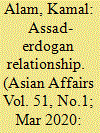

|
|
|
|
|
| Summary/Abstract |
Much has been made of the once brotherly relationship between Syrian President Bashar al Assad and the Turkish President Recep Teyep Erdogan. Indeed, this relationship formed the bedrock of Turkey's much-vaunted move towards the Arab world and its re-engagement with regions on which Ataturk and his successive Kemalist Generals had shut a door. Yet, more than fifteen years after the historic first visits by the Turkish and Syrian leaders to each other's capitals, the Syria-Turkey relationship lies in ruins. Whilst much of the focus of the war in Syria has been on the exaggerated sectarian divide in the Middle East and the great power rivalry between the United States and Russia, a key aspect overlooked is the fundamental relationship between Turkey and Syria. The last two decades of this relationship have been defined by Assad and Erdogan. As Turkey slowly begins to re-engage with Syria one can trace the tumultuous relationship between the two neighbours in the immediate aftermath of the dissolution of the Ottoman Empire. The Arab nationalists and Turkish nationalists have been at daggers drawn over the make up of the border. Syria has never forgotten the land-grab of the Turks in the aftermath of the French exit of the Levant. Furthermore, the diverse set of communities – the Greeks, the Armenians, the Kurds and the Syriacs – that make up the inhabitants of the region still suffer from the effects of the mismanagement of the French exit and what is seen by many of these communities as an illegal annexation by Turks and Arabs. However, under the Syrian Arab Republic the Christians of all denominations including the Armenians and Greeks flourished whilst Turkey forced only one identity upon its once diverse people. This article will argue that the relationship between Syria and Turkey has ebbed and flowed – and this dynamic is rooted in history where successive Turkic dynasties have favoured Syria as their pivot to control the region. Similarly, when Syria became less important, the very foundation of the Turkic and later Turkish influence became weak in the region. The close relationship between Erdogan and Assad overturned more than six decades of animosity, but once Erdogan turned his back to Assad and supported the overthrow of the Syrian government the relationship fell apart. As the end of the war nears, a defining factor to end this war will be how Turkey and Syria reconcile or interact. The Syrian Kurds now seem to be back in Assad's corner as they prefer to be under Damascus' sovereignty then under attack from Ankara across the border. The Kurdish question is of significant value to both Syria and Turkey; it has been a major reason for both countries to be at peace and war. A closer look at the history of these two countries' relationship proves that the Assad-Erdogan relationship has mirrored the history of the two states since the fall of the Ottoman Empire. Their future in more than one way is now inter-twined on how they interact with each other.
|
|
|
|
|
|
|
|
|
|
|
|
|
|
|
|
| 2 |
ID:
182831
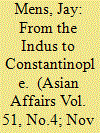

|
|
|
|
|
| Summary/Abstract |
This article argues that Napoleon Bonaparte's attempt to reach India, firstly through Egypt and then through Qajar Persia, inaugurated the ‘Middle East' as a coherent political space in international politics. The ostensibly existential threat posed by French schemes to British dominion over India prompted British Indian officials to perceive Egypt, Persia and the Gulf Emirates through the lens of Indian defence and European geopolitics for the first time. By the end of this period, these lands were imagined as a salient, somewhat coherent political space between “the Indus and Constantinople”. This first ‘Middle East’ was the product of the globalization of European geopolitics and the need to defend British India, auguring the future of the region, in which its political importance, and even its location, was constructed in relation to the broader context of international affairs.
|
|
|
|
|
|
|
|
|
|
|
|
|
|
|
|
| 3 |
ID:
179343
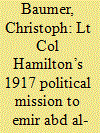

|
|
|
|
|
| Summary/Abstract |
This article is an account of the political mission of Lt Col Robert Edward Archibald Hamilton (later Udny-Hamilton, 11th Lord Belhaven and Stenton, 1871–1950) to the Emir Abd Al-Aziz Al-Saud of Najd in 1917. It particularly draws on Hamilton's private diaries, as well as other reports and notes as well as on Philby's Report on Najd Mission 1917–1918. It contains an account of the political and military background to the mission in the Arab world and Mesopotamia in the context of the First World War, including Ibn Saud's relationships with the Ottomans, Kuwait, the British, Sharif Hussain, and the Ajman tribe. It also contains further biographical information about Hamilton.
|
|
|
|
|
|
|
|
|
|
|
|
|
|
|
|
| 4 |
ID:
154347
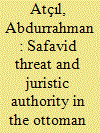

|
|
|
|
|
| Summary/Abstract |
This article investigates the opinions of three senior Ottoman jurists, Sarıgörez (d. 1522), Kemalpaşazade (d. 1534), and Ebussuud (d. 1574), on the subject of the Safavids and their supporters. Historians have treated these opinions as part of the vast polemical literature uniformly intended to justify an impending Ottoman attack against their Safavid rivals. Questioning the notion that all authors shared an undifferentiated attitude, this article underlines that, unlike most polemical literature, the opinions of these three jurists focused on the religiolegal aspects of the Safavid issue and varied and evolved in line with changing historical realities, the jurists’ divergent assessments of the Safavid threat, and their preference for different jurisprudential doctrines. Based on an analysis of the opinions, I argue that these jurists assumed a high degree of autonomy as producers and interpreters of the law and thus did not necessarily feel obliged to legitimate or excuse every imperial action.
|
|
|
|
|
|
|
|
|
|
|
|
|
|
|
|
| 5 |
ID:
168974
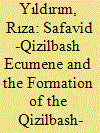

|
|
|
|
|
| Summary/Abstract |
Alevis, the largest religious minority of Turkey, also living in Europe and the Balkans, are distinguished from both Sunnis and Shiʿites by their latitudinarian attitude toward Islamic Law. Conceptualizing this feature as “heterodoxy,” earlier Turkish scholarship sought the roots of Alevi religiosity in Turkish traditions which traced back to Central Asia, on the one hand, and in medieval Anatolian Sufi orders such as the Yasawi, Bektashi, Qalandari, and Wafaʾi, on the other. A new line of scholarship has critiqued the earlier conceptualization of Alevis as “heterodox” as well as the assumption of Central Asian connections. In the meantime, the new scholarship too has focused on medieval Anatolian Sufi orders, especially the Bektashi and Wafaʾi, as the fountainhead of Alevi tradition. Critically engaging with both scholarships, this paper argues that it was the Safavid-Qizilbash movement in Anatolia, Azerbaijan, and Iran rather than medieval Sufi orders, that gave birth to Alevi religiosity.
|
|
|
|
|
|
|
|
|
|
|
|
|
|
|
|
| 6 |
ID:
183467


|
|
|
|
|
| Summary/Abstract |
In the early modern period, there were some parts of Europe that tensions never ended. As part of the great Ottoman expansion, skirmishes, robbery, and taking slaves occurred almost on a daily basis in Dalmatia from the 15th to 18th centuries. At the beginning, the Venetian defence of the Dalmatian coastal communities was based on small mercenaries’ troops and locally recruited men. The establishment of a complex defence system of Military Border i.e. Krajina based on new human power provided by Morlach immigrants was possible only after few great wars in the 18th century.
|
|
|
|
|
|
|
|
|
|
|
|
|
|
|
|
| 7 |
ID:
152615
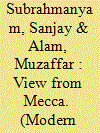

|
|
|
|
|
| Summary/Abstract |
This article examines the history of Gujarat-Red Sea relations in the first quarter of a century after the Ottoman conquest of the Hijaz, in the light of Arabic narrative sources that have hitherto been largely neglected. While earlier historians have made use of both Ottoman and Portuguese archives in this context, we return here to the chronicles of Mecca itself, which prove to be an unexpectedly interesting and rich source on the matter. Our main interest is in the figure of Jarullah ibn Fahd and his extensive annalistic work, Nayl al-munā. A good part of our analysis will focus on the events of the 1530s, and the dealings of Sultan Bahadur Shah Gujarati's delegation to the Ottomans, headed by ‘Abd al-‘Aziz Asaf Khan. But we shall also look at the longer history of contacts, and conclude with brief remarks on the relevance of the career of the celebrated Gujarati-Hijazi intellectual, Qutb al-Din Muhammad Nahrawali. We thus hope to add another important, concrete dimension to our understanding of India's location in the early modern Indian Ocean world, as a tribute to the career and contribution of David Washbrook, our friend and colleague.
|
|
|
|
|
|
|
|
|
|
|
|
|
|
|
|
| 8 |
ID:
162830
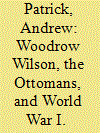

|
|
|
|
|
|
|
|